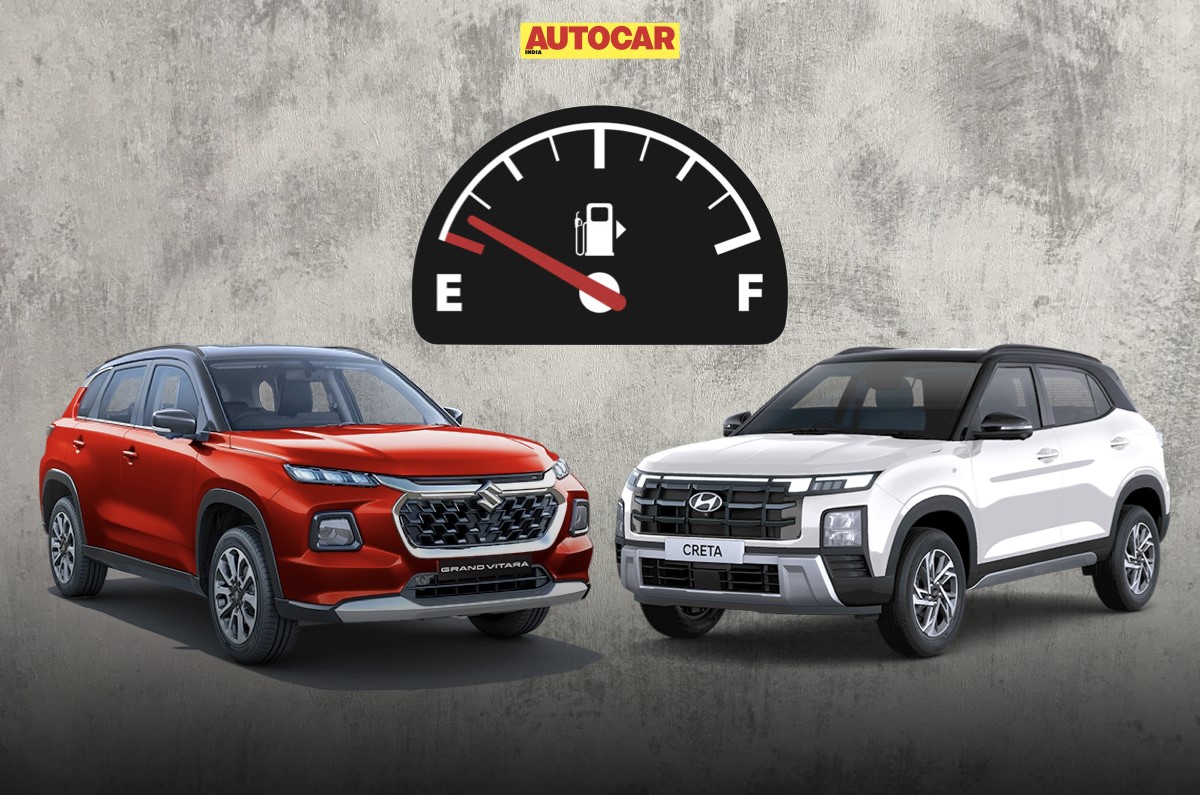
The Maruti Suzuki Grand Vitara and Hyundai Creta are fierce and popular rivals in the midsize SUV segment, and their respective petrol-automatic versions see more than decent demand. The Grand Vitara in petrol-AT form is priced between Rs 13.6 lakh-16.91 lakh, while Hyundai has set the Creta petrol-CVT’s price between Rs 15.86-18.88 lakh.
Maruti Grand Vitara vs Hyundai Creta: petrol powertrain
Both midsize SUVs are powered by their respective 1.5-litre four-cylinder naturally aspirated petrol engines. The Creta’s makes 115hp and 144Nm, and the Grand Vitara’s produces 103hp and 137Nm. While Hyundai offers a CVT option with its petrol engine, Maruti offers a 6-speed torque convertor automatic gearbox option, and mild-hybrid tech that includes auto start/stop, torque assist and brake energy recuperation.
ARAI has rated the Creta petrol-CVT and Grand Vitara petrol-AT at 17.7kpl and 20.58kpl, respectively, which means that on paper, the Maruti is far more frugal than the Hyundai. Does that translate to the road as well?
Maruti Grand Vitara vs Hyundai Creta: efficiency, range
| Grand Vitara vs Creta petrol-auto: fuel-efficiency | ||
|---|---|---|
| Maruti Grand Vitara | Hyundai Creta | |
| Engine type | 4-cyl, NA, mild-hybrid | 4-cyl, NA, |
| Capacity | 1462cc | 1497cc |
| Power | 103hp at 6000rpm | 115hp at 6300rpm |
| Torque | 137Nm at 4400rpm | 144Nm at 4500rpm |
| Gearbox | 6-speed AT | CVT |
| Fuel efficiency (city) | 11.6kpl | 10.31kpl |
| Fuel efficiency (highway) | 15.3kpl | 13.78kpl |
| Fuel efficiency (combined) | 13.45kpl | 12.05kpl |
| Price range | Rs 13.6 lakh-16.91 lakh | Rs 15.86-18.88 lakh |
In our comprehensive fuel efficiency tests, the Grand Vitara delivered 11.6kpl in the city, thanks to the auto start/stop system, while it managed to go 15.3km on a litre of petrol on the highway, in part due to the engine spinning at a comfortable 2,000rpm at 100kph. The overall real world fuel-efficiency figure for the Grand Vitara petrol-AT stands at 13.45kpl, which is more than 7kpl less than the ARAI rating.
Meanwhile, the Creta was able to deliver 10.31kpl in the city and 13.78kpl on the highway, giving the petrol-CVT SUV a combined real-world efficiency of 12.05kpl; down 1.4kpl when compared to the Grand Vitara. The highway efficiency figure was lower than expected as at cruising speeds, the engine’s torque deficit was prominent and the CVT tended to step outside its comfort zone and felt too reactive to accelerator inputs.
All prices, ex-showroom, Delhi
Also see:
Maruti Suzuki Grand Vitara long term review; 13,700 km report
2024 Hyundai Creta long term review, 1,700km report
Citroen C3 Aircross real world fuel economy tested, explained



